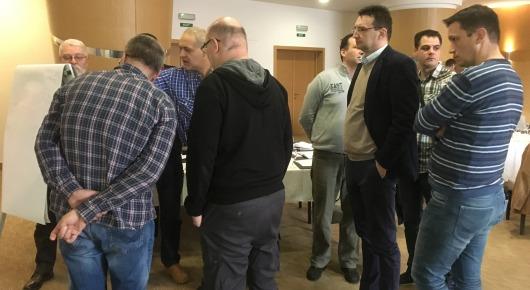Inception workshop of the project “African Swine Fever emergency preparedness in the Balkans” (TCP/RER/3704)
Hybrid Event, 18/02/2019 - 21/02/2019

Background
African swine fever (ASF) is a contagious viral disease of pigs and wild boar that may cause mortalities of up to 100 percent of affected animals, and there is no vaccine to prevent it. Wild boar and pigs can infect each other by direct contact, particularly when blood is present. Healthy animals can also get infected when they consume undercooked pork products, either while scavenging or when fed uncooked swill. They can also become infected by feeding on infected pork or carcasses, or through contaminated tools and equipment (clothes, needles, vehicles, etc.).
Originally restricted to Africa, ASF was introduced into Georgia in 2007, from where it progressively spread westwards (reaching Eastern and Central Europe) and eastwards. Despite the huge efforts and investments, no country has been able to control it effectively, because of the difficulty to prevent the spread via wild boar and backyard systems, and the absence of a vaccine. Once the disease enters a country, it is extremely difficult to bring it under control, unless the veterinary services, pig farmers and other stakeholders are ready to react promptly and stamp it out.
The disease has been reported in Bulgaria, Hungary and Romania in 2018, thus seriously threatening the Balkans. Should ASF enter the region, the disease may rapidly spread throughout due to the continuous and dense wild boar population and the highly prevalent backyard sector. The effects on the livelihoods of the rural populations, the costs of control measures in the absence of a vaccine and the impact of trade would all be considerable.
The Balkans have not been exposed to ASF, which implies that the level of awareness among stakeholders and the technical knowledge on the disease are low, and contingency or surveillance plans may not be in place.
The objective of the project is to improve the preparedness of the region against African swine fever.
Participants
The workshop will bring together representatives from the state veterinary services (i.e. National Project Coordinators), hunter associations, NGOs/institutions working with pig farmers, and national agencies in charge of regulating hunting, from the five recipient countries; international agencies (OIE and EFSA); observer countries (Croatia, Hungary and Romania); plus the international FAO experts/trainers.
Workshop Objectives
• To present the project objectives, outputs and activities
• To discuss and fine-tune the project activities and timeline, in synergy with ongoing activities at country level
• To provide training on key aspects of ASF prevention, preparedness and control
Presentations
African swine fever - Activities and Future Program of FAO
Daniel Beltran-Alcrudo, Animal Health Officer, FAO Regional Office for Europe and Central Asia
The role of OIE in the global control of African Swine Fever
Dr Budimir Plavsic, OIE Regional Representative. Head of RR in Moscow
Overview of FAO Technical Cooperation Programme Strategic Framework, presence in the region
Daniel Beltran-Alcrudo, Animal Health Officer, FAO Regional Office for Europe and Central Asia
Key components of the TCP - Timeline, activities, etc.
Daniel Beltran-Alcrudo, Animal Health Officer, FAO Regional Office for Europe and Central Asia
Risk assessment on African swine fever transmission from different matrices
Sofie Dhollander, EFSA Animal Health and Welfare Team
Essentials and basics of ASF
Klaus Robert Depner, Head of working group, Federal Research Institute for Animal Health
Early disease detection Surveillance
Klaus Robert Depner, Head of working group, Federal Research Institute for Animal Health
Epidemiological farm investigations
Subjectivity
HRP
Klaus Robert Depner, Head of working group, Federal Research Institute for Animal Health
Case reports (EXAMPLES)
Klaus Robert Depner, Head of working group, Federal Research Institute for Animal Health
Role of biosecurity in protecting farms against ASF
KlaasDietzeand Klaus Depner, Federal Research Institute for Animal Health
Interpretation of clinical and diagnostical results
Klaus Robert Depner, Head of working group, Federal Research Institute for Animal Health
Role of wild boar in ASF epidemiology
Klaus Robert Depner, Head of working group, Federal Research Institute for Animal Health
ASF in wild boar –what to do? The EU-approach
The roleofthe„wild boar-habitat cycle“ forASF transmissiontodomesticpigs
Federal Research Institute for Animal Health
Country Presentations
Hungarian experience with African swine fever in wild boar
MoA, Hungary
Romania - Epidemiological situation of ASF
The National Sanitary Veterinary and Food Safety Authority of Romania
